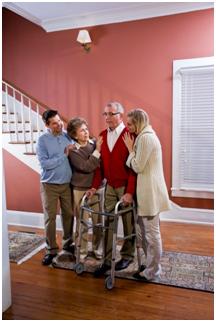14 Nov 2016
Elderly Care Service in Bryn Mawr – What is Elder Self-Neglect and What Are the Warning Signs?
 Elder self-neglect is a problem that is often seen by providers of elderly care service in Bryn Mawr, and experts on aging around the country agree that elder self-neglect is one of the biggest “hidden” problems facing seniors today.
Elder self-neglect is a problem that is often seen by providers of elderly care service in Bryn Mawr, and experts on aging around the country agree that elder self-neglect is one of the biggest “hidden” problems facing seniors today.
What is elder self-neglect? The National Adult Protective Services Association defines it as: “Seniors or adults with disabilities who fail to meet their own essential physical, psychological or social needs, which threatens their health, safety and well-being.”
In other words, in most cases, elder self-neglect is an inability of older people to properly care for themselves, due to reduced facilities as they age. Self-neglect is one of the biggest signs that an older person may need more proactive elderly care service in Bryn Mawr.
Six Signs Someone You Love May Be Suffering from Self-Neglect
1. Poor Personal Hygiene
Poor hygiene is often the most obvious warning sign. As one advances in age, he or she may begin to neglect aspects of personal hygiene or presentation. Some signs would include unkempt hair, untrimmed nails, unwashed clothes, or an obvious lack of regular bathing.
2. Unclean Living Areas
Conversely, individuals may be keeping themselves clean, but unable to maintain their residence. Some signs would include excessive dust, cobwebs, overflowing trash, piles of dirty clothing, and rotting food in the sink or refrigerator.
3. Difficulty or Refusal to Manage Medication
An inability to stick to a medication schedule is often another big warning sign. However, be aware that they may also have legitimate reasons for refusing their meds. If a senior refuses medication, talk to him/her first and find out whetherunpleasant side effects are being experienced.
4. Dehydration, Malnutrition or Other Preventable Health Problems
Such issues are generally obvious, both in their presentation and the dangers they represent. Rapid weight loss is often a key red flag, particularly if you notice the person lacks sufficient food in their refrigerator or pantry. Seniors often lack the desire or willingness to cook for themselves regularly. If your senior is having trouble with this issue, help make ahead some individual frozen meals or arrange for regularassistance.
5. Life-Affecting Financial Problems
Another clear sign an older person needs help is if they are unable to manage their finances properly. Unpaid bills or utility shutoffs are warning signs of larger problems.
6. Reclusive Behaviors
Some older people have the tendency to become reclusive. Reclusive behavior can occur specifically because the individual knows aspects of their own care, or the care of their home, have become unacceptable. Or they may be depressed and unwilling or unable to seek help. Either way, a refusal to leave home or allow others into their homes is a troubling sign.
Call Neighborly Home Care for Caring and Experienced Elderly Care Service in Bryn Mawr
If you notice one or more of these indicators, schedule time to talk with your loved ones and learn what their needs are. You may want to consider seeking part or full-time assistance for them. Neighborly Home Care offers professional elderly care service in Bryn Mawr and other Main Line communities. Contact the team at Neighborly Home Care today for more information and a free consultation.
Contact Us
Are you a Home Care Worker?
Free Dementia FAQs eBook
The families we serve keep saying great things.
I just wanted to tell you how grateful we are that Neighborly Home Care stepped in & took over taking care of my Dad when we really needed it, no questions asked. Our caregiver has become part of the family and we know we can depend on her being there every day & taking great care of my Dad. He misses her when she’s not there!